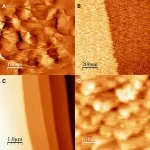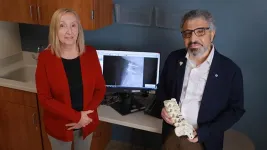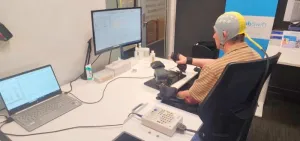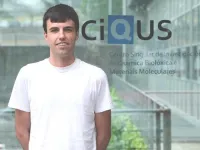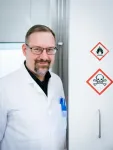(Press-News.org) The University of Texas at San Antonio (UTSA) has joined one of two newly established university consortia committed to nuclear security and nonproliferation. The consortia were awarded $50 million in cooperative agreements by the Office of Defense Nuclear Nonproliferation in the U.S. Department of Energy’s National Nuclear Security Administration (DOE NNSA).
“The pressing challenges of nuclear security and nonproliferation require a concerted effort from experts across the country,” said JoAnn Browning, UTSA interim vice president for research. “We’re thrilled to join this collaborative network of universities and national labs, and I look forward to seeing the impact of our researchers as they leverage AI to make nuclear energy more secure, protecting the integrity of the U.S. nuclear stockpile as well as the collective impact of the broader consortium.”
The consortia were established to facilitate collaboration between university and laboratory researchers to advance science and technology that furthers NNSA's nuclear security and nonproliferation missions, “enabling an effective pipeline of talented next-generation experts to establish careers at DOE national laboratories.” Each consortium will receive up to $5 million per year for five years to further these objectives.
UTSA’s participation will be led by Miltos Alamaniotis, GreenStar Endowed Fellow in Energy and associate professor of electrical and computer engineering. Alamaniotis is an expert in applied artificial Intelligence within the nuclear engineering domain.
This marks the second NNSA consortium that UTSA will participate in to advance nuclear science. In 2019, NNSA provided $3 million in funding for CONNECT (The CONsortium on Nuclear sECurity Technologies), a project engaging investigators from the University of Nevada at Las Vegas, St. Mary’s University, Argonne National Laboratory and Los Alamos National Laboratory.
“The exceptional researchers at UTSA are critical partners in this collaboration,” said Eric Brey, dean of the Klesse College of Engineering and Integrated Design at UTSA. “UTSA is home to world-class researchers and innovators in the nuclear fields. Connecting with our peer institutions and national labs will catalyze our scientific advancements and enhance our students’ experience in this field.”
Alamaniotis is also confident that membership in the consortium will benefit researchers and students.
“This consortium will be an eye-opener for our students, as they will have the chance to interact and collaborate with students from top schools across U.S., while performing high-quality research in a critical field of national and international interest,” he said. “Furthermore, in a consortium of this large scale our students will have the chance to prove themselves and showcase the qualities and capabilities of UTSA.”
Alamaniotis is a co-principal investigator in the consortium and the principal investigator (PI) representing UTSA, where he leads research efforts and prepares students for careers in the nuclear enterprise.
Each PI in the consortium is responsible for contributing to collaborative research as well as leading one research project of their own. Alamaniotis will lead a project that “focuses on developing artificial intelligence algorithms to coordinate the movement of multiple mobile detectors within a metropolitan area to identify hidden radiological threats,” he said.
“This project is particularly challenging due to the presence of naturally occurring ambient radiation and the uncertainty regarding the type of threat,” added Alamaniotis. “Anyone in possession of illicit nuclear material is a threat to our safety. We want to prevent detonation and dispersion of radioactive material within metropolitan areas, and there is only way to accomplish this: detect the material while on the move before it is detonated. We also need to retain privacy in data analysis, as we cannot allow mistakes and wrongly accuse people as potential terrorists. This can only be attained by developing highly sophisticated AI algorithms fed with high-quality datasets.”
The two consortia that are receiving funding from the U.S. Department of Energy will be led by the University of Tennessee, Knoxville and Georgia Institute of Technology respectively.
They include:
Enabling Capabilities in Technology Consortium, led by the University of Tennessee, Knoxville.
This consortium comprises 15 universities and eight national laboratories, including UTSA, the Colorado School of Mines, the Air Force Institute of Technology, Clemson, UC Santa Barbara, University of Hawaiʻi, Louisiana State, MIT, North Carolina State, University of Oklahoma, Oregon State, Texas A&M, University of Utah, Virginia Tech, Idaho National Laboratory, Lawrence Berkeley National Laboratory, Lawrence Livermore National Laboratory, Los Alamos National Laboratory, Oak Ridge National Laboratory, Pacific Northwest National Laboratory, Sandia National Laboratories and Savannah River National Laboratory.
Consortium for Enabling Technologies and Innovation, led by Georgia Tech.
This consortium comprises 12 universities in partnership with 12 national laboratories, including Abilene Christian, Colorado School of Mines, MIT, The Ohio State University, Rensselaer Polytechnic Institute, Stony Brook University, Texas A&M, University of Alaska Fairbanks, UT-Austin, University of Wisconsin - Madison, Virginia Commonwealth, Argonne National Laboratory, Brookhaven National Laboratory, Idaho National Laboratory, Lawrence Berkeley National Laboratory, Lawrence Livermore National Laboratory, Los Alamos National Laboratory, Nevada National Security Site, Oak Ridge National Laboratory, Pacific Northwest National Laboratory, Princeton Plasma Physics Laboratory, Sandia National Laboratories and Savannah River National Laboratory.
The formation of the consortia began in November 2023, when the NNSA released a call for proposals. Interested schools extended invitations to potential collaborators. The University of Tennessee, Knoxville took the initiative to lead the proposal for the consortium that includes UTSA. It identified target research areas and invited individuals, including Alamaniotis, to participate. The NNSA conducted the final selection process, which was highly competitive.
UTSA has a growing number of academic and research opportunities in the broader area of security and cybersecurity. It boasts several centers and institutes devoted to security, including the National Security Collaboration Center, the Cybersecurity Manufacturing Innovation Institute, the Center for Infrastructure Assurance and Security, the Institute for Cyber Security, the Cyber Center for Security and Analytics, as well as the NSF CREST Center for Security and Privacy Enhanced Cloud Computing. UTSA is also one of a select few universities to hold all three NSA designations for centers in academic excellence in: Cyber Defense Education, Cyber Research and Cyber Operations. UTSA offers undergraduate, graduate, and doctoral programs with a focus on cybersecurity.
“Our school is renowned for its cybersecurity programs,” added Alamaniotis. “This initiative will establish a new line of research in security, broadening the scope of security research at UTSA in a domain of the utmost importance for our society and future energy sustainability.”
END
UTSA joins new consortium dedicated to nuclear security and nonproliferation
This marks the second NNSA consortium that UTSA will participate in to advance nuclear science
2024-07-09
ELSE PRESS RELEASES FROM THIS DATE:
Diabetes increases the risk of failure in spinal fusion procedures
2024-07-09
A new study from orthopaedic researchers at The University of Toledo has found lumbar spinal fusion procedures are far more likely to fail in individuals with diabetes.
“We’ve known for a long time that diabetic patients are at high risk of infection from any surgery, including spinal fusion,” said Dr. Hossein Elgafy, a professor of orthopaedics in the College of Medicine and Life Sciences and chief of spine surgery at UTMC. “More recently, however, physicians have taken a closer look at the high ...
Brain-computer interface therapy for stroke survivors
2024-07-09
A personalized brain-computer interface therapy, RehabSwift, significantly enhances hand mobility for stroke survivors. Strokes often lead to impaired hand function, presenting substantial challenges in daily activities. Sam Darvishi and colleagues developed and tested a brain-computer interface therapy that translates imagined hand movements into real actions using a personalized algorithm and bionic hands. The study involved twelve chronic stroke survivors from South Australia who had limited use of their arms but retained clear thinking abilities. Throughout 18 sessions, participants used the RehabSwift system, which included a special cap that ...
SynGAP Research Fund (SRF) increases support for SYNGAP1 organoid research at the University of Southern California’s Quadrato Lab
2024-07-09
MILL VALLEY, Calif. – July 9, 2024 – SynGAP Research Fund (SRF), a 501(c)(3) public charity whose mission is to improve the quality of life for patients suffering from SYNGAP1-Related Disorders (SRD) through the research and development of treatments, therapies, and support systems, has awarded a $130,000 grant to the University of Southern California’s Quadrato Lab to inspect and stratify the effects of specific SYNGAP1 variants on their patient-derived neuronal model system, furthering the world’s understanding ...
Study finds 1 in 12 patients labeled as having ‘benign’ results actually had high-risk prostate cancer
2024-07-09
New research highlights the challenge of balancing the risks of overdiagnosing and underdiagnosing prostate cancer early enough to intervene and minimize risk of death. Recently, some experts have called for the lowest grade of prostate cancer—biopsy Gleason Grade Group (GGG) 1—to be reclassified as ‘benign.’ But a new study led by a researcher from Mass General Brigham has found that many patients with a biopsy GGG1 may have a more aggressive cancer than their biopsy alone suggests.
By looking at data from more than 10,000 patients at a university in Germany, researchers found that at least 8 percent of patients with this ...
Marcos Vilela wins Lilly Research Award for Doctoral Students
2024-07-09
The Royal Spanish Society of Chemistry (RSEQ) and Lilly have announced the winning theses of the 22nd Research Awards for Doctoral Students, which acknowledge outstanding work in the fields of Organic, Pharmaceutical, and Analytical Chemistry. Marcos Vilela, currently pursuing his PhD at the Center for Research in Biological Chemistry and Molecular Materials (CiQUS) at the University of Santiago de Compostela (USC), was awarded alongside Andrea Palone from the University of Girona (UdG) and the University of Rome "Tor Vergata," and Beatriz Arévalo from the Complutense University of Madrid (UCM).
Marcos' thesis, supervised by CiQUS Principal ...
Trust, more than knowledge, critical for acceptance of fully autonomous vehicles
2024-07-09
PULLMAN, Wash. – While not yet on the market, fully autonomous vehicles are promoted as a way to make road travel dramatically safer, but a recent study found that knowing more about them did not improve people’s perception of their risk. They needed to have more trust in them too.
This study adds to the evidence from other research that knowledge alone is not enough to sway people’s attitudes toward complex technology and science, such as gene editing or climate change. In this case, Washington State University researchers found that trust in the autonomous vehicles’ reliability and performance played the strongest role in improving ...
Run screaming or slow retreat? New study advances understanding of brain responses to emotionally-charged scenes
2024-07-09
The ability to recognise and respond to emotionally-charged situations is essential to a species’ evolutionary success. A new study published today [July 9th] in Nature Communications advances our understanding of how the brain responds to emotionally charged objects and scenes.
The research, led by Trinity College Dublin neuroscientist Prof. Sonia Bishop and Google researcher Samy Abdel-Ghaffar while he was a PhD student in Prof. Bishop's lab at UC Berkeley, has identified how the brain represents different categories of emotional stimuli in a way that allows for ...
Brain neurotransmitter receptor antagonist found to prevent opioid addiction in mice
2024-07-09
New research led by UCLA Health has found a drug that treats insomnia works to prevent the addictive effects of the morphine opioids in mice while still providing effective pain relief.
The study, published in the journal Nature Mental Health, concluded that suvorexant, which blocks brain receptors for a neurotransmitter called hypocretin, prevents opioid addiction. At high doses in humans, suvorexant induces sleep and is used to treat insomnia. But sleep was not induced, and behavioral alertness was maintained, at the much lower doses effective in preventing ...
Nerve damage from breast cancer treatment can be predicted
2024-07-09
Many women treated for breast cancer using taxanes, a type of cytostatic drug, often experience side effects in the nervous system. Researchers at Linköping University have developed a tool that can predict the risk level for each individual. The tool could help doctors adapt treatment to avoid persistent side effects in those at the greatest risk.
More and more people are becoming cancer survivors. But even if they have survived the disease, an increasing number still suffer from the side effects of cancer treatment. In a recent study from Linköping University, researchers studied the side effects of taxanes, ...
Water stored under artificial turf could make cities cooler and safer to play in
2024-07-09
For those living in cities, space to play sports outside can be a scarcity. Recently, natural grass in parks or public sports courts has often been replaced with more durable artificial turf to allow heavy consecutive use.
There are, however, downsides to this practice, both for people and for cities as a whole. Now, scientists in the Netherlands have set out to change that by integrating a subsurface water storage and capillary irrigation system under artificial turf sports fields.
“Here we show that including a subsurface water storage and capillary ...
LAST 30 PRESS RELEASES:
Brainwaves of mothers and children synchronize when playing together – even in an acquired language
A holiday to better recovery
Cal Poly’s fifth Climate Solutions Now conference to take place Feb. 23-27
Mask-wearing during COVID-19 linked to reduced air pollution–triggered heart attack risk in Japan
Achieving cross-coupling reactions of fatty amide reduction radicals via iridium-photorelay catalysis and other strategies
Shorter may be sweeter: Study finds 15-second health ads can curb junk food cravings
Family relationships identified in Stone Age graves on Gotland
Effectiveness of exercise to ease osteoarthritis symptoms likely minimal and transient
Cost of copper must rise double to meet basic copper needs
A gel for wounds that won’t heal
Iron, carbon, and the art of toxic cleanup
Organic soil amendments work together to help sandy soils hold water longer, study finds
Hidden carbon in mangrove soils may play a larger role in climate regulation than previously thought
Weight-loss wonder pills prompt scrutiny of key ingredient
Nonprofit leader Diane Dodge to receive 2026 Penn Nursing Renfield Foundation Award for Global Women’s Health
Maternal smoking during pregnancy may be linked to higher blood pressure in children, NIH study finds
New Lund model aims to shorten the path to life-saving cell and gene therapies
Researchers create ultra-stretchable, liquid-repellent materials via laser ablation
Combining AI with OCT shows potential for detecting lipid-rich plaques in coronary arteries
SeaCast revolutionizes Mediterranean Sea forecasting with AI-powered speed and accuracy
JMIR Publications’ JMIR Bioinformatics and Biotechnology invites submissions on Bridging Data, AI, and Innovation to Transform Health
Honey bees navigate more precisely than previously thought
Air pollution may directly contribute to Alzheimer’s disease
Study finds early imaging after pediatric UTIs may do more harm than good
UC San Diego Health joins national research for maternal-fetal care
New biomarker predicts chemotherapy response in triple-negative breast cancer
Treatment algorithms featured in Brain Trauma Foundation’s update of guidelines for care of patients with penetrating traumatic brain injury
Over 40% of musicians experience tinnitus; hearing loss and hyperacusis also significantly elevated
Artificial intelligence predicts colorectal cancer risk in ulcerative colitis patients
Mayo Clinic installs first magnetic nanoparticle hyperthermia system for cancer research in the US
[Press-News.org] UTSA joins new consortium dedicated to nuclear security and nonproliferationThis marks the second NNSA consortium that UTSA will participate in to advance nuclear science

